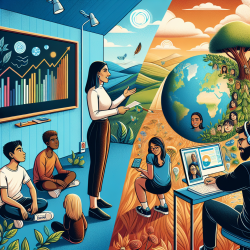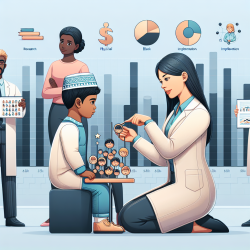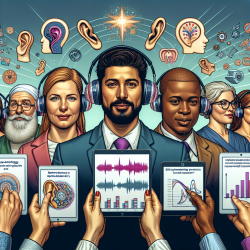In the ever-evolving landscape of education and therapy, practitioners are increasingly called to address broader societal issues that impact their students' well-being. One such pressing issue is climate change—a multifaceted challenge that intersects with human rights and demands a thoughtful response from educators and therapists alike.
The Intersection of Climate Justice and Education
The research article "Climate Justice, Humans Rights, and the Case for Reparations" by Audrey R. Chapman and A. Karim Ahmed sheds light on the profound implications of climate change as a human rights challenge. This challenge is particularly pertinent to vulnerable populations, including children in low-income countries who are disproportionately affected by the adverse effects of global warming.
For educators and therapists working in schools, understanding these dynamics is crucial. By integrating the principles of climate justice into their practice, they can better support students who may be experiencing the direct or indirect impacts of climate change.
Actionable Steps for Practitioners
- Educate Yourself: Stay informed about the latest research on climate change and its socio-economic impacts. This knowledge will empower you to address related issues in your practice effectively.
- Advocate for Change: Use your platform to advocate for policies that promote climate justice and human rights. Encourage your school district to adopt sustainable practices.
- Incorporate Environmental Education: Integrate lessons on environmental stewardship into your curriculum to raise awareness among students about their role in combating climate change.
- Create a Supportive Environment: Foster an inclusive environment where students feel safe discussing their concerns about climate change and its effects on their lives.
- Collaborate with Experts: Partner with organizations like TinyEYE that offer online therapy services tailored to address the unique challenges posed by climate-related stressors.
The Role of Reparations in Addressing Inequities
The concept of climate reparations is pivotal in addressing the historical injustices faced by low-income countries that have contributed minimally to global emissions yet suffer the most severe consequences. As educators, recognizing this injustice can inform how we support students from diverse backgrounds who may be affected by these disparities.
The proposed Global Climate Reparations Fund aims to provide financial assistance to countries most impacted by climate change. This initiative highlights the importance of accountability and redress in promoting global equity—a principle that can be mirrored in educational settings by ensuring all students have equal access to resources and support.
Encouraging Further Research
While this blog provides a starting point, practitioners are encouraged to delve deeper into the topic of climate justice. Engaging with comprehensive research can enhance your understanding and enable you to implement more effective strategies within your practice.
To read the original research paper, please follow this link: Climate Justice, Humans Rights, and the Case for Reparations.










